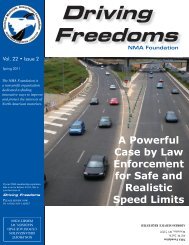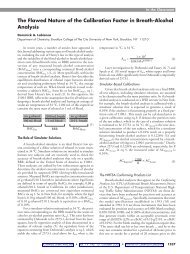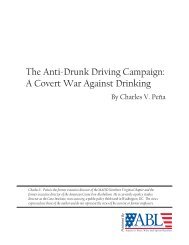by James J. Baxter, President, NMA - National Motorists Association
by James J. Baxter, President, NMA - National Motorists Association
by James J. Baxter, President, NMA - National Motorists Association
Create successful ePaper yourself
Turn your PDF publications into a flip-book with our unique Google optimized e-Paper software.
6NATIONAL MOTORISTS ASSOCIATION FOUNDATION NEWSStop SignsBy John Carr, Massachusetts ActivistThis is the third in a series ofarticles on the Manual OnUniform Traffic ControlDevices.)"Please put a stop sign on mystreet to slow down speeders.''"That intersection is an accidentwaiting to happen.''Such requests are frequentlyheard <strong>by</strong> a city traffic engineer'soffice. Although many cities willroutinely install stop signs basedsolely on such complaints, they areoften hurting safety in their attemptto placate residents.(By the way, the second complainthas been declared politicallyincorrect <strong>by</strong> the <strong>National</strong> HighwayTraffic Safety Administration.They say, "there are no accidents''and the word "crash'' should beused instead.)<strong>NMA</strong> members who live in urbanareas might not realize that manyintersections around the countryhave no stop signs or traffic signalsat all. A stop sign is a substantialinconvenience to drivers andincreases the chance of a rear-endcollision. On low volume roadsthe benefits often do not outweighthe costs.The first step in intersectioncontrol is to make traffic stop on onestreet only. The goal is to assignright of way where failure to do sowould be hazardous. Before thesigns are erected, an engineer shouldobserve the intersection anddetermine that one of two conditionsis present: drivers on a major roadwould be surprised <strong>by</strong> drivers"Please put a stop sign on my street toslow down speeders.''entering from a minor road withoutstopping (e.g. because all the near<strong>by</strong>intersections have stop signs ortraffic signals), or the intersection isinherently dangerous (e.g. it haspoor visibility or a serious accidenthistory).More often a city is decidingwhether to convert a two way stop toa multiway stop, an intersectionwhere all traffic must stop. TheMUTCD calls for more caution inthis case. In particular, the engineershould do more research and comeup with a written recommendation.There are two main reasons toinstall multiway stop signs: fairnessand safety. Posting stop signs ononly one road at an intersection maycause long delays waiting for trafficon the other road. If the minor roadcarries at least 200 vehicles per hourand the average delay exceeds 30seconds, it may be appropriate tostop traffic on the major road too. Aserious accident history (five ormore per year) can also justifymultiway stop signs.Multiway stop signs work bestwhen traffic volumes are moderateand about equal on all streets. Ifthere is little traffic entering from theside street, drivers on the main streetwill see no reason to stop. If trafficis heavy, a traffic signal should beused instead.So back to the complaints."Do something about speeders.''The MUTCD says "stop signsshould not be used for speedcontrol.'' There are two reasons forthis advice: such signs areineffective and dangerous. StopContinued on page 9Rental Fine UndoneThe article Your Rental Car IsWatching You (July/August2001 issue of <strong>NMA</strong>F NEWS)discussed a situation in Connecticutwhere Acme Rent-A-Car was usingGPS technology to track their rentalcars. Any time the renters exceededthe speed limit, they would automaticallyhave a $150 fine chargedto their account.The Department of ConsumerProtection filed a complaint last Julyaccusing Acme of violating thestate's Unfair Trade Practices Act.Commissioner <strong>James</strong> T. Flemingof the department approved thedecision of the hearing officer thatAcme is to stop this policy andrefund an estimated $13,000 ormore.Acme claims that this policy wasenacted to discourage dangerousspeeders and cover the excessivewear on vehicles driven at higherspeeds.Fleming has stated that the $150charge far exceeded the average 37cents in auto damage caused <strong>by</strong>speeding, making it an illegalpenalty, not repayment for incurreddamage. And, that it isn't Acme'sjob to enforce the speed limit in anystate.Currently, there are 26 customerswho were charged <strong>by</strong> Acme, one ofwhom actually accrued a $450 finefor speeding from the company.Fleming has also asked statelawmakers to make fines like thisillegal.Source: Associate PressMARCH/APRIL 2002






